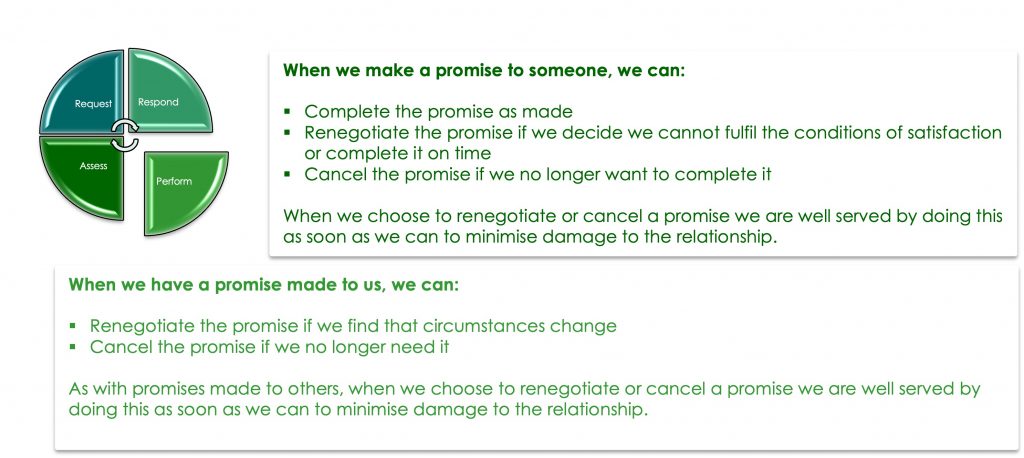
A promise is a commitment to future action and always involves a risk that something may happen to preclude it being performed. For instance, a promise could be made based on an expectation of another promise being fulfilled. If the first promise is not completed, then other commitments may suffer. There is nothing extraordinary here; rather this is the nature of life. We make promises based on how the world is for us at the time and this may change as life happens.
When we are unable to fulfil our promises, our identity is at stake and assessments of our trustworthiness are likely made by others. We can minimise any damage to those relationships by revoking or renegotiating the promise as soon as practicable. Although they will likely not be happy about this, it is likely to cause them less damage and consequently there will be less damage to our trustworthiness and the relationship.
This can be thought of in terms of control and choice. When we make a promise to someone, they hand over control of those actions and outcomes to us. This is an act of trust. In principal, they do not ask someone else to take the same action. If they did, that would be speak to other concerns. If we are unable to fulfil our obligation, then letting them know means we also pass control back to them. They might not like the situation but at least they can choose what to do about it.
To hand back control in the situation, we can cancel or renegotiate the promise as soon as we become aware we cannot fulfil it. For instance, consider the difference between learning yesterday that someone will not be meeting with me for lunch today as opposed to them ringing whilst I am waiting at the restaurant. If I had found out yesterday, I would not have made the trip and been able to spend my time doing something else. When they tell me about the change infers the level of care they have for me and our relationship.
The same applies if someone has made a promise to us and there is a change to what we require. Again, we take care of the relationship and how they see us by cancelling or renegotiating the commitment.
In an organisational context, this has very important implications for how to manage others. Consider a person who is seen as someone who meets most of their commitments and will let others know when they cannot do so. It is likely their identity with others is they do not need to be constantly asked about how this and that commitment are going. Rather than being ‘micro-managed’, others will trust they will let them know when something is not going to be done. Such a situation leads to more autonomy and more time for people to get on with their work rather than focusing on what others are doing. Honouring our promises is an effective way of building trust and increasing effectiveness.
Completing the actions involved in a promise is often seen as the end of the matter and very often this is indeed the case. For instance, if I ask you to get me a cup of coffee and you agree, it will be obvious to me when you have fulfilled your promise as I will have my coffee. However, some promises do not involve direct engagement with the requester. There might be a promise such that the requester may not know when the promise has been fulfilled. An IT help desk is such an example when people log problems about their computers. Often the computer technician looks at the problem when the person who uses the computer is not there. The technician may resolve the issue yet leave the person unaware of the resolution and they will continue to believe the problem still exists.
Even though it may not seem important, a declaration of completion is a very necessary step in managing promises. When it is done, the other person knows that they can begin to assess the outcome and whether it meets their requirements. If completion is not declared, they may continue to assume incompletion and wait. In the case of the computer problem above, the computer may continue to go unused.
In the business world, declaring completion can also be seen as good customer service – keeping customers informed. It also provides customers with the opportunity to show appreciation.
Furthermore, consistent declarations of completion may raise a leader’s trust that promises will be kept or at least honoured.
A declaration of completion can also help people who feel they are not getting recognition at work. These declarations often lead to positive recognition thereby enhancing our identity with others and our self-story.
